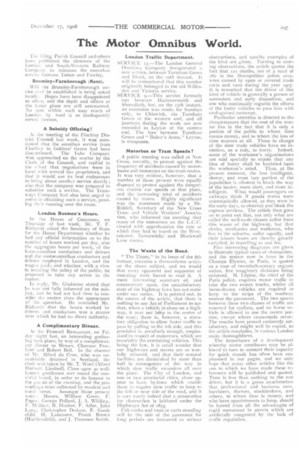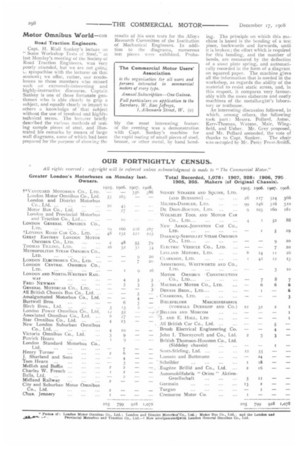The Motor Omnibus World.
Page 7

Page 8

If you've noticed an error in this article please click here to report it so we can fix it.
The Fling Parish Council and others have petitioned the directors of the Londoi: and South-Western Railway Company to reinstate the motorbus service between 'rotten and Fawley.
Bromley-Farnborough (Kent).
Will the Bromley-Farnborough service ever be established is being asked locally. Hopes have been disappointed so often, and the dep6t and offices at the latter place are still untenanted. No spot within such easy reach of Londoe by road is so inadequately served :hereon,
A Subsidy Offering!
Al the meeting of the Finchley District Council last week, it was mentioned that the omnibus service from Finchley to Golders' Green had been discontinued, The Tube Company was approached on the matter by the Clerk of the Council, and replied to the 'feet that negotiations were in hand with several bus proprietors, and that it would use its best endeavours to bringabout another service shortly ; also that the company was prepared to subsidise such a service. The Tramways Company had also been urged to assist in obtaining such a service, pending the:r running over the route.
London Busmen's Hours.
In the House of Commons, on Thursday of last week, Mr. T. F. Richards asked the Secretary of State for the Home Department whether he had any official information as to the number of hours worked per day, also the aggregate hours per week, of the horst-omnibus conductors and drivers and the motor-omnibus conductors and drivers employed in London, and the wages paid; and whether, with a view to securing the safety of the public, he proposed to take any action in the matter.
In reply, Mr. Gladstone stated that he was not fully informed on the subject, and he had not had time to consider the matter since the appearance of the question. He reminded Mr. Richards that the hours worked by drivers and conductors was a_ matter over which he had no direct authority.
A Complimentary Dinner.
At the Frascati Restaurant, on Friday night last, an interesting gathering took place, by way of a complimentary dinner to Messrs. Clarence Freeland and Robert Bell. In the absence of Mr. Alfred du Cros, who was unavoidably detained in Scotland, the chair was taken by Mr. T. Woof (Alfred Herbert. Limited). Close upon 30 wellknown gentlemen met round the convivial l.oard, in order to do honour to the gueats of the evening, and the proceedine s were enlivened by musical and
vocal items. Amongst those present were : Messrs. William Greer, F. Poppe. George Pollard, J. A. Wilding, F. •Mellimr, B. Hooker, F, Adler, John Lang, Christopher Dodson, F. Goodchild, H. Lancaster, Frank Brown (Huddersfield), and J. Thomson Smith. London Traffic Department.
SERVICE 1 .—The London General Onmi,AA, Company inaugurated a new service, between Turnham Green and Word, on the loth instant. It will be rememhered that this number originally belonged to the old \Vides. den and Victoria service.
SERVICE 9.—This service formerly ran between Hammersmith and Shoreditch, but, on the 13th instant, an extension was made, for Sundays only, to Chiswick, via Turnham Green at the western end, and all journeys during the week are now extended to Leyton at the eastern end, The fare between Turnham Green and " Baker's Arms," Leyton, is ninepence.
Motorbus or Tram Speeds ?
A public meeting was called at New Cross, recently, to protest against the frequency of accidents caused by motorbuses and motorcars on the tram routes. It was very evident, however, that a number of those present were equally disposed to protest against the dangerous electric car speeds at that place, and the increasing total of accidents caused by trams. Highly significant was the statement made by a Mr. Riddell, Secretary of the New Cross Tram and Vehicle Workers' Association, who informed the meeting that many of the motormen on the L.C.C. viewed with apprehension the rate at which they had to travel on the Westminster, Greenwich, and Blackwall Lane routes.
The Waste of the Road.
" The Times," in its issue of the 8th instant, contains a three-column article on the above subject, and we would that every opponent and supporter of motoring were forced to read it. A more i:M:resting summary of, and commentary upon, the unsatisfaCtory state of the highway laws has not come under our notice. It is pointed out, in the course of the article, that there is nothing in any Act of Parliattent to say that, when a vehicle is.alone on a highway, it may not k&p to the centre of the road ; there is, however, a statutory obligation to allow faster traffic to pass bv pullingto the left side, and this provision is, peculiarly enough, emphasised in respect of motorcars, which are invariably the overtaking vehicles. This being the law, it is small wonder that our highways and streets are so woefully misused, and that their natural facilities are diminished by more than half in consequence of the way in which slow traffic meanders all over the place. The City of London, and one or two provincial cities, alone appear to have by-laws which enable them to require slow traffic to keep to the left or near side of the road, and it is very rarely indeed that a prosecution for obstruetion is initiated under the Highways Act of 1835.
Cab ranks and vans or carts standing still by the side of the pavement for long periods are instanced as serious obstructions, and specific examples of the kind are given. Turning to 1/10Viog obstructions, the article quotes the fact that 121 deaths, out of a total of 252 in the Metropolitan police area, were caused by open or covered trade carts and vans during the year 1907. It is remarked that the driver of this kind of vehicle is generally a person of somnolent and surly disposition, and One who continually regards the efforts of the faster vehicles to pass him with undisguised contempt.
Particular attention is directed to the circumstances that the root of the matter lies in the fact that it is only a portion of the public to whom time means money, and to whom the loss of time matters at all. Those in charge of the slow trade vehicles have no incentive, as a rule, to hurry. Indeed, some of the workmen's organisations are said specially to enjoin that any idea of hurry shall be banished from the workman's mind. Thus, at the presenL moment, the less intelligent, slower, and most lazy portion of the population is allowed to block the way of the busier, more alert, and more intelligent_ What would passengers on railways think if goods trains were systematically allowed, as they were in the early days, to obstruct and block the express services. The article then goes on to point out that, not only what are called the well-to-do classes suffer from this waste of the highway, but that clerks, mechanics and workmen, who live in the suburbs, suffer equally, and their leisure hours are thereby greatly curtailed, in travelling to and fro.
Five interesting diagrams are given to illustrate typical cases of obstruction, and the system now in force in the Champs Ely0es, in Paris, is quoted as a case of twentieth-century organisation, five imaginary divisions being enforced. M. Isepines the chief of the Paris police, requires motor traffic to take the two centre tracks, whilst all horse-drawn vehicles are required to keep to the strips of the roadway nearest the pavement. The two spaces between these two classes of traffic are reserved for cyclists, and no horse vehicle is allowed to use the centre portion, •except where cross-roads occur. The results have proved eminently satisfactory, and might well be copied, so the article concludes, in various London main thoroughfares. The importance of a development whereby motor omnibuses may be allowed to turn to account their capacity for quick transit has often been emphasised in our pages, and we only hope that many other articles like the one to which we have made these references will be published and quoted. Time is less than nothing to the van driver, but it is a gross anachronism that professional and business men, barristers, doctors, stockbrokers, and others, to whom time is Money, and who have appointments to keep, should he barred from all the advantages of rapid movement in streets which are. crtiliciuillvscongested by the lack of traffic regulation. Road Traction Engineers.
Capt. H. Riall Sankey's lecture on " Some Workshop Tests of Steel," at last Monday's meeting of the Society of Road Traction Engineers, was very poorly attended, but we are not going s..L sympathise with the lecturer on that account ; we offer, rather, our condolences to those members who missed such an extremely-interesting and highly-instructive discourse. Captain Sankey is one of those fortunate gentlemen who is able clearly to grip a subject, and equally clearly to impart to others a knowledge of that subject without the use of involved and highlytechnical terms. The lecturer briefly described the various methods of testing sample pieces of steel, and illustrated his remarks by means of large wall diagrams, some of which had been prepared for the purpose of showing the results of his own tests for the Alloys Research Committee of the Institution of Mechanical Engineers. In addition to the diagrams, numerous test pieces were exhibited. Praha bly the most interesting feature of the evening was a demonstration with Capt. Sankey's machine for the rapid testing of small pieces of steel, bronze, or other metal, by hand bend
ing. The principle on which this machine is based is the bending of a test piece, backwards and forwards, until it is broken ; the effort which is required for this bending, and the number of bends, are measured by the deflection of a stout plate spring, and automatically recorded in the form of a diagram on squared paper. The machine gives all the information that is needed in the workshop, as regards the ability of the material to resist static stress, and, in this respect, it compares very favourably with the more elaborate and costly machines of the metallurgist's laboratory or testhouse. An interesting discussion followed, in which, among others, the following took part : Messrs. Pollard, Aston, Kerr-Thomas, Watson, Mair, Wing-, field, and Usher. Mr. Grey proposed, and Mr. Pollard seconded, the vote of thanks to Capt. Sankey. The chair was occupied by Mr. Percy Frost-SmitE.






















